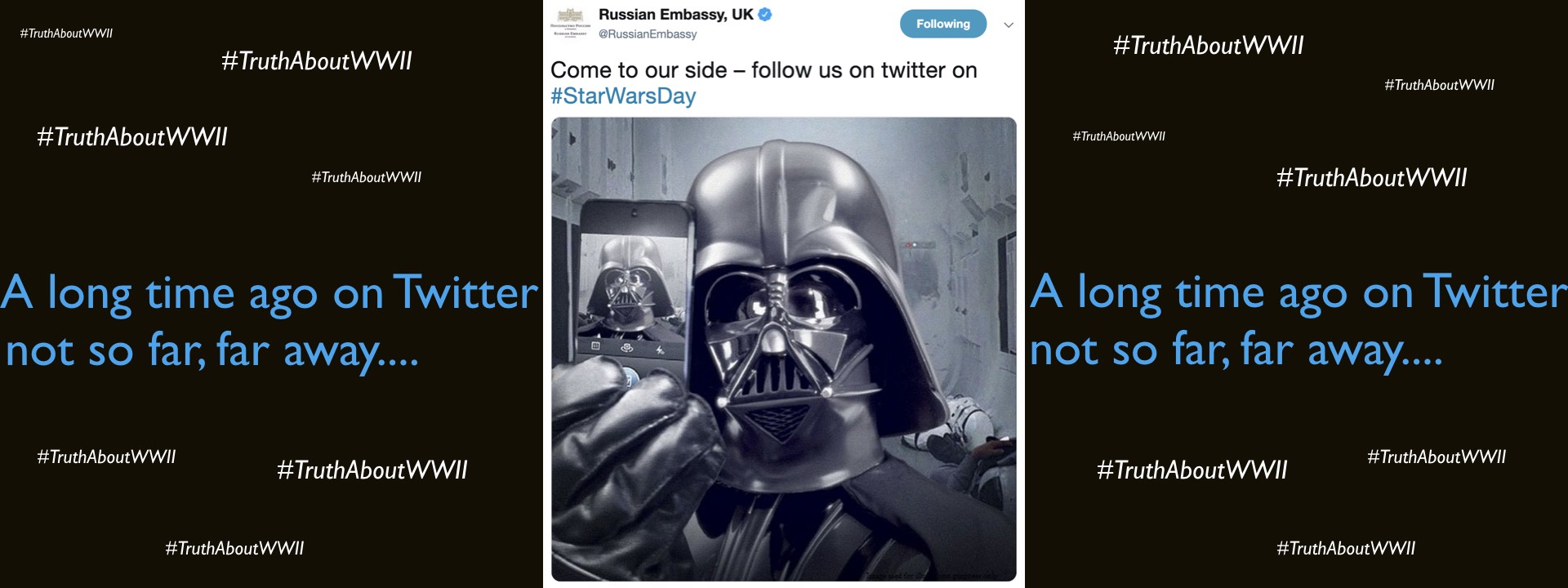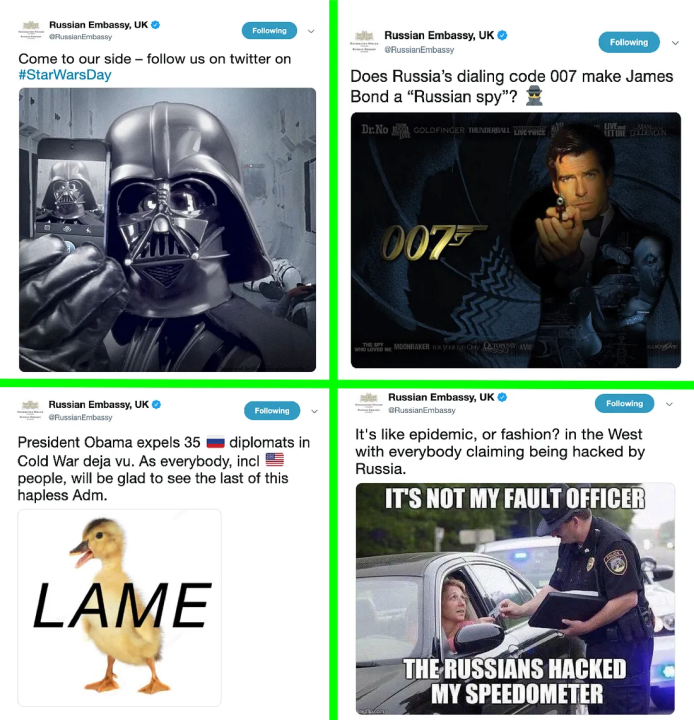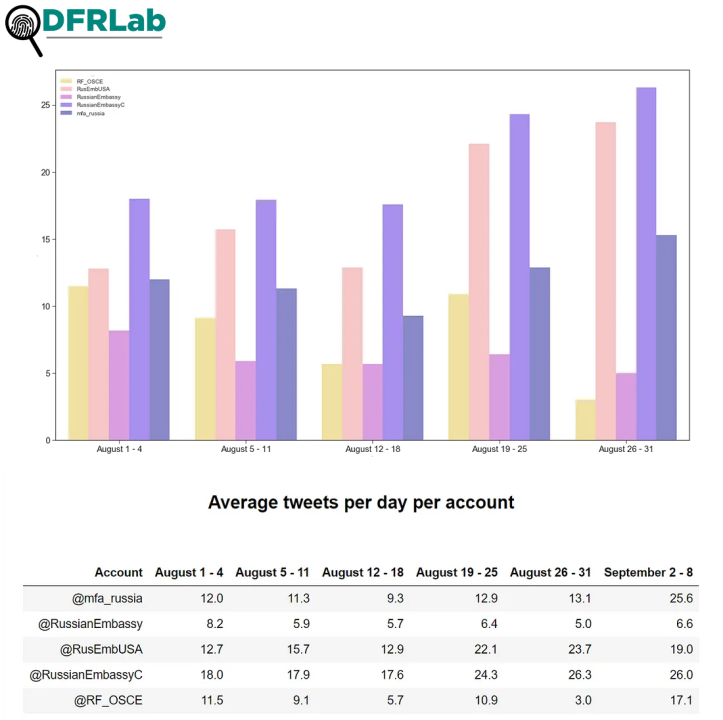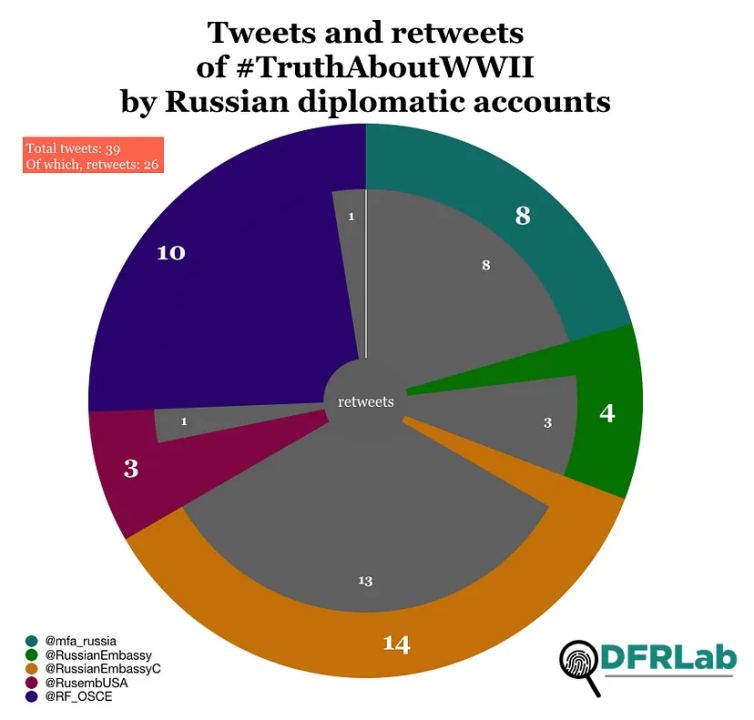Russian diplomatic Twitter accounts rewrite history of World War II
Official Twitter accounts amplified the hashtag #TruthAboutWWII in an effort to justify the Soviet Union’s signing of the Nazi-Soviet Nonaggression Pact
Russian diplomatic Twitter accounts rewrite history of World War II

BANNER: (Source: @EtoBuziashvili/DFRLab via @RussianEmbassy/archive)
Ahead of the 80th anniversary of the World War II Nazi-Soviet Pact on August 23, 2019, official Russian diplomatic Twitter accounts launched the hashtag #TruthAboutWWII to present a distorted narrative concerning the signing of the pact and the start of World War II.
The Kremlin has long presented the Soviet Union and its regime as the lone defender against Nazi Germany during World War II, and the fact that the Soviet Union initially allied itself with the latter would undermine the myth-making. Successfully distorting history, in particular by covering up the Soviet Union’s crimes, would provide the current Russian government with a basis to justify some of its contemporary actions as allegedly predicated on history. The DRFLab has previously exposed the Kremlin’s attempts to rewrite history, including by rehabilitating Stalin’s image and building statues of Soviet icons in an effort to glorify the Soviet past.
Kremlin Twitter trolling dates back years
As the DFRLab has previously noted, the Kremlin tends to employ a full spectrum model of propaganda. This model marshals both traditional state-sponsored media outlets, such as RT and Sputnik, and social media accounts to disseminate disinformation. Some of these social media accounts are bots and trolls, which do not claim an official affiliation with the Russian government, but a portion of them are official government channels: the Kremlin’s diplomatic Twitter accounts.
In recent years, Russia has used its official government Twitter accounts to reproach its critics and troll Western officials. The Twitter accounts of Russia’s Ministry of Foreign Affairs, as well as the Russian embassies in the United Kingdom, Canada, the United States, South Africa, and the Russian Mission to the OSCE have been particularly active in this regard.
In one example, the Russian Embassy in the United Kingdom posted a photo of Darth Vader, the iconic villain of the popular Star Wars series, and urged people to “come to our side” by following the account.

#TruthAboutWWII
On August 19, 2019, the official account of the Russian Mission to the Organization for Security and Co-operation in Europe (OSCE) announced the launch of a hashtag, #TruthAboutWWII, dedicated to “Twitter publications” on “the international law prerequisites for the start of #WWII.”
📢 @RF_OSCE launches a series of Twitter publications with the hashtag #TruthAboutWWII, dedicated at this stage to the international law prerequisites for the start of #WWII. Do not miss it! #TrueHistory pic.twitter.com/Uv9OgVig5S
— Russian Mission OSCE (@RF_OSCE) August 19, 2019
The hashtag launched on August 19, 2019, four days before the 80th anniversary of the 1939 Nazi-Soviet Treaty of Nonaggression, also known as the Molotov-Ribbentrop Pact. The treaty included a secret protocol that divided Europe into spheres of influence between the two totalitarian regimes, paving the way for World War II in the process. Official Soviet policy did not deny the existence of the pact, which was public knowledge, but it did deny the existence of the secret protocol that divided Europe.
After the Twitter account of the Russian Mission to OSCE launched the hashtag #TruthAboutWWII, other Russian official diplomatic accounts rushed to amplify it.
One of the main claims pushed by the diplomatic accounts about the Nazi-Soviet pact was that an unwilling Soviet Union was forced to sign the agreement.

The DFRLab analyzed the spread of the hashtag #TruthAboutWWII using Hoaxy, a tool that visualizes the spread of claims and fact checking. The results suggested that the two main amplifiers of the hashtag, other than the Russian Mission to the OSCE, were the accounts of the Russian Embassy in the United States and the Russian Mission to the European Union.

In comparison to the period of August 1–18, Russian diplomatic Twitter accounts were relatively active during the week beginning on August 19. The DFRLab examined the tweet intensity of five Russian diplomatic accounts that used and amplified the #TruthAboutWWII hashtag. From August 19–25, in the lead up to and during the anniversary on August 23, the accounts increased the rate at which they tweeted.


Out of the 2,003 tweets posted by all five accounts in August, only 39 mentioned #TruthAboutWWII, out of which 13 were original tweets and the remaining 26 were retweets.

On Twitter, official Russian diplomatic accounts worked especially hard to justify the Molotov-Ribbentrop Pact ahead of its 80th anniversary, claiming that the Soviet Union was forced to sign the treaty. The Kremlin’s account, however, deliberately omitted certain details: namely, that the pact paved the way for the Soviet and Nazi invasions of Poland as well as the Soviet invasion of Finland and occupation of the Baltic states. These details are critical to understanding the start of World War II, and their omission is further evidence of the Kremlin’s distortion of the historical record.
Follow along for more in-depth analysis from our #DigitalSherlocks.

